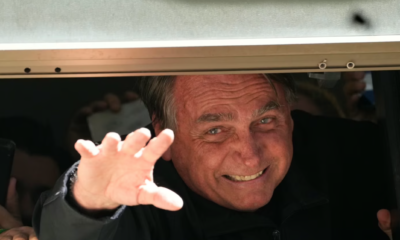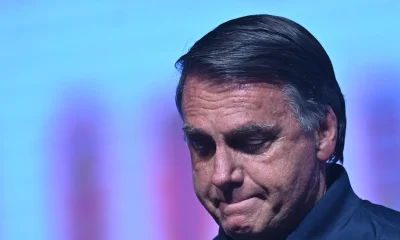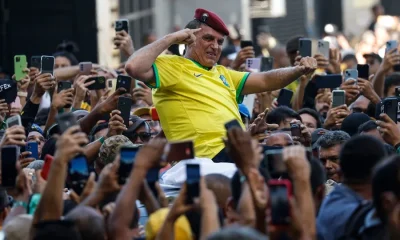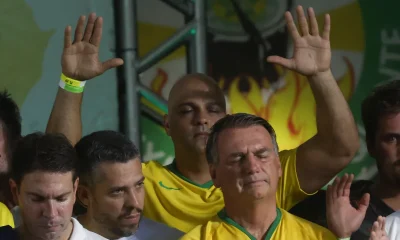International
Bolsonaro ‘authorizes’ transition without acknowledging defeat
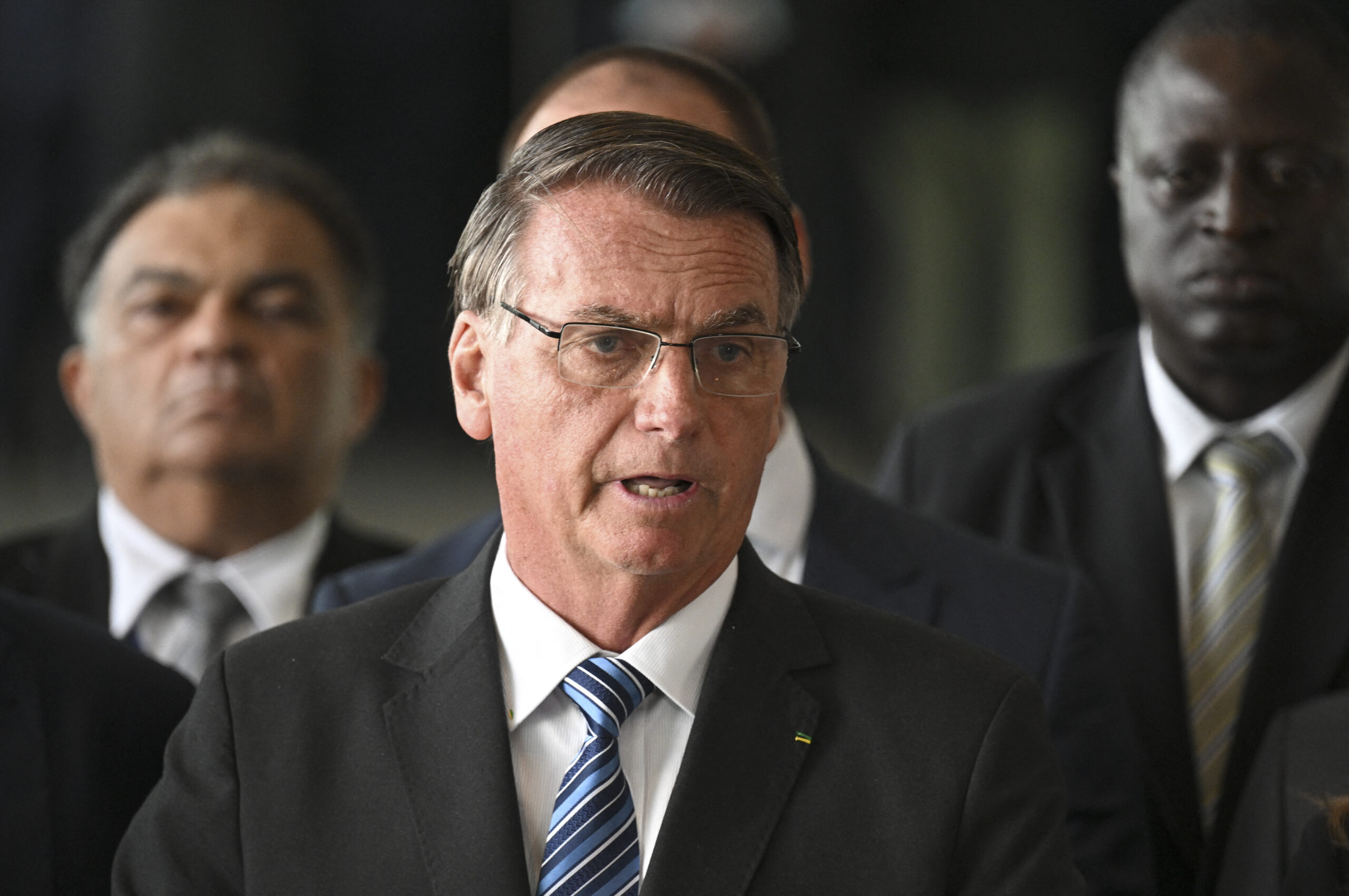
| By AFP | Marcelo Silva De Sousa |
Brazil’s President Jair Bolsonaro on Tuesday “authorized” the transition to a new government, without acknowledging his defeat to leftist rival Luiz Inacio Lula da Silva.
Bolsonaro, 67, broke two days of silence after his razor-thin loss to Lula on Sunday, which sparked protests from his supporters across the country and fanned fears he would not accept the outcome.
In a speech that lasted just over two minutes, the far-right incumbent neither acknowledged defeat, nor congratulated Lula on his victory.
Bolsonaro started by thanking the 58 million Brazilians who voted for him, before commenting that the roadblocks erected by his supporters across the country were “the fruit of indignation and a feeling of injustice at how the electoral process took place.”
“Peaceful protests will always be welcome,” he said, adding that people should not be impeded from coming and going.
“As president of the Republic and a citizen I will continue to comply with our constitution,” he said, before handing the podium to his chief of staff Ciro Noguiera, who said Bolsonaro had “authorized” the “start of the transition” process.
Lula’s Workers’ Party announced Tuesday that his vice-president-elect Geraldo Alckmin would lead the transition process which would begin on Thursday. Lula will be inaugurated for his third term as president on January 1.
No concession call
Bolsonaro’s appearance, however succinct, capped two days of tensions over how he would respond to such a narrow loss after months of alleging fraud in the electoral system.
“Anyplace else in the world, the defeated president would have called me to recognize his defeat,” Lula said in his victory speech to a euphoric sea of red-clad supporters in Sao Paulo on Sunday night.
Bolsonaro remained silent even as key allies publicly recognized his loss, including the powerful speaker of the lower house of Congress, Arthur Lira.
Federal Highway Police (PRF) on Tuesday reported more than 250 total or partial road blockages in at least 23 states by Bolsonaro supporters, which they were attempting to disperse, in some cases firing teargas at demonstrators.
Protesters wearing the yellow and green of the Brazilian flag, which the outgoing president has adopted as his own, said they would not accept the outcome of the election.
“We will not accept losing what we have gained, we want what is written on our flag, ‘order and progress’. We will not accept the situation as it is,” Antoniel Almeida, 45, told AFP at a protest in Barra Mansa, Rio de Janeiro.
On Monday night, Judge Alexander de Moraes of the Supreme Court ordered police to disperse the blockades immediately. He was acting in response to a request by a transport federation that complained it was losing business.
‘Strength of our values’
Bolsonaro became the first incumbent president in Brazil not to win re-election in the post-dictatorship era after a four-year term in which he came under fire for his disastrous handling of the Covid-19 pandemic, which left more than 680,000 dead in Brazil.
He also drew criticism for his vitriolic comments, polarizing style and attacks on democratic institutions and foreign allies.
Bolsonaro used his brief speech to reflect on his time in office and said the victory of a majority of right-wing candidates in Congress “shows the strength of our values: God, homeland, family, and liberty.”
“Our dreams are more alive than ever. Even in the face of the system, we overcame a pandemic and the consequences of a war,” Bolsonaro said, referring to Russia’s war against Ukraine, which has reverberated around the globe with rising prices and concerns of a major food crisis. “I was always labeled undemocratic and unlike my accusers, I always played within the limits of the constitution.”
Lula gets to work
The post-election drama follows a dirty and divisive election campaign between Bolsonaro and Lula, who returns to office in a dramatic comeback.
Brazil’s president between 2003 and 2010, Lula crashed into disgrace in a corruption scandal that landed him in jail before his conviction was thrown out due to bias from the lead judge. However, he was not exonerated.
The election outcome showed just how polarized the country is between the two very different leaders.
Lula scored 50.9 percent to Bolsonaro’s 49.1 percent — the narrowest margin in Brazil’s modern history.
With a massive to-do list, Lula leaped into action, meeting Argentine President Alberto Fernandez in Sao Paulo and holding a series of phone calls with US President Joe Biden, France’s Emmanuel Macron, Germany’s Olaf Scholz, UN Secretary-General Antonio Guterres and others.
International
Claudia Sheinbaum: Operation Against ‘El Mencho’ Was Based on Pending Arrest Warrants

Mexico’s President Claudia Sheinbaum on Wednesday rejected claims that the military operation that resulted in the death of Nemesio Oseguera Cervantes, known as “El Mencho,” leader of the Jalisco New Generation Cartel (CJNG), was carried out under pressure from the United States government.
Sheinbaum explained that the deployment of federal forces was aimed at executing outstanding arrest warrants against Oseguera Cervantes, who was considered one of the most wanted criminals in both Mexico and the United States.
“That was not the objective (to ease pressure from the United States). It is very important, and I want to repeat it. This individual had an arrest warrant, or several,” Sheinbaum said, referring to the operation conducted on February 22.
According to the president, the initial goal was to capture Oseguera Cervantes, but military forces responded after coming under attack during the intervention.
“The operation was to detain him. The problem is that they were attacked — the Secretariat of National Defense — and they responded at that moment,” she said.
The president insisted that the action was not carried out in response to external demands, although she acknowledged intelligence cooperation with the United States.
“It was not done in any way because of pressure from the United States, not at all. Of course, there was intelligence information from the United States that was used specifically,” she concluded.
International
Spain Denies Any Agreement to Cooperate with U.S. Military in Iran Operations
International
White House Says Spain Agrees to Cooperate with U.S. Military After Trump Threatens Trade Embargo

White House Press Secretary Karoline Leavitt said Wednesday that Spain has agreed “in recent hours” to cooperate with the U.S. military, following President Donald Trump’s threat to impose a trade embargo on Madrid.
Trump had warned of potential commercial measures after Spain reportedly refused to allow the Pentagon to use facilities at Spanish military bases for operations related to Iran.
“With respect to Spain, I think you heard the president’s message yesterday loud and clear, and I understand that in recent hours they have agreed to cooperate with the United States military,” Leavitt said during a press briefing.
She added that the U.S. military is currently coordinating with its counterparts in Spain. However, the president expects broader support.
“The president expects that all of Europe, all of our European allies, of course, will cooperate in this important mission — not only for the United States, but also for Europe,” Leavitt said.
Her remarks came in response to questions about Spain’s position and its role as a U.S. ally amid rising tensions surrounding operations involving Iran.
-

 International4 days ago
International4 days agoIran Reports 201 Dead, 747 Injured After U.S. and Israeli Strikes
-

 International3 days ago
International3 days agoBrazil’s Supreme Court Rejects Bolsonaro’s Bid for House Arrest
-

 International4 days ago
International4 days agoPope Leo XIV Urges End to ‘Spiral of Violence’ in Middle East
-

 International3 days ago
International3 days agoAnti-ICE Billboard Campaign Targets Immigration Spending in 31 U.S. Cities
-

 Sin categoría5 days ago
Sin categoría5 days agoTrump: ‘We Think It’s True’ Amid Claims Iran’s Supreme Leader Was Killed
-

 International5 days ago
International5 days agoSecurity Council to Hold Emergency Meeting on Middle East Crisis
-

 International2 days ago
International2 days agoSpain’s Prime Minister to Address Nation Amid Trump’s Trade Threats
-

 International3 days ago
International3 days agoTrump Warns of ‘Major Wave’ of Attacks as Iran Conflict Escalates
-

 International3 days ago
International3 days agoMexico Calls for Immediate Probe After National Dies in ICE Custody
-

 International17 hours ago
International17 hours agoWhite House Says Spain Agrees to Cooperate with U.S. Military After Trump Threatens Trade Embargo
-

 International17 hours ago
International17 hours agoSpain Denies Any Agreement to Cooperate with U.S. Military in Iran Operations
-

 International2 days ago
International2 days agoNew York Announces First 2,000 Seats in Universal 2-K Program
-

 International3 days ago
International3 days agoBolivia Orders Three Investigations Into Deadly Military Plane Crash
-

 Central America17 hours ago
Central America17 hours agoNicaragua Held Responsible for Harassment of Opposition Prosecutor and His Family
-

 Central America3 days ago
Central America3 days agoPanama Canal Monitoring Trade as Middle East Conflict Disrupts Shipping
-

 International2 days ago
International2 days agoWarner Bros. Developing First ‘Game of Thrones’ Movie With ‘Andor’ Writer
-

 Central America2 days ago
Central America2 days agoGuatemala’s Attorney General Fails in Bid for Top Court Seat Amid Corruption Allegations
-

 International17 hours ago
International17 hours agoClaudia Sheinbaum: Operation Against ‘El Mencho’ Was Based on Pending Arrest Warrants































